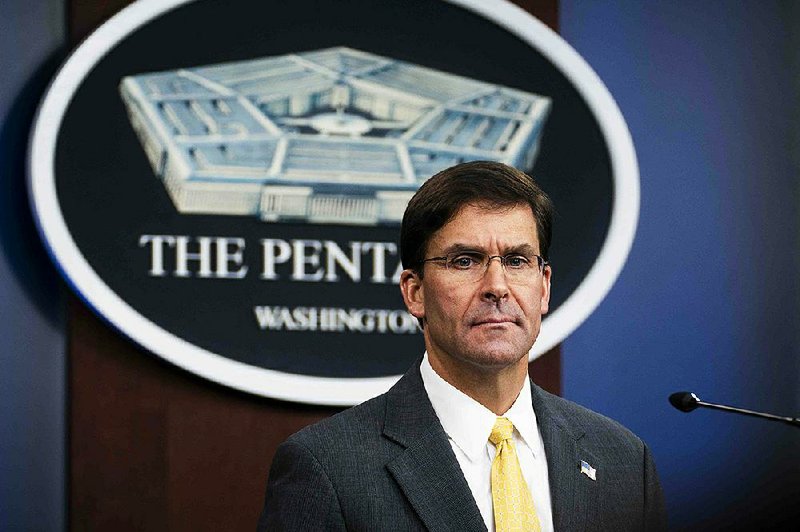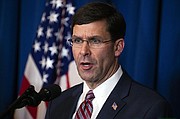WASHINGTON -- Defense Secretary Mark Esper said Sunday that he had seen no hard evidence that four American embassies had been under possible threat when President Donald Trump authorized the targeting of Iran's top commander, raising questions about the scale of the threat described by Trump last week.
Many members of Congress have expressed concerns about Trump's handling of Iran, complaining that the administration did not consult them in advance of the Jan. 3 drone strike that killed Gen. Qassem Soleimani and did not adequately brief lawmakers afterward.
Trump complicated the debate by asserting on Fox News that he had to strike quickly because intelligence showed Iran could have attacked four American embassies.
Both Esper and national security adviser Robert O'Brien on Sunday said they agreed that Iran could have hit U.S. embassies, including in the Iraqi capital. But Esper, when asked on CBS' Face the Nation whether there was a specific piece of evidence, replied: "I didn't see one with regard to four embassies."
But in response to a question about whether Trump was "embellishing" the threat, Esper said, "I don't believe so."
As the administration struggled with its justification for the strike that killed Soleimani, Esper and other officials tried to refocus attention on voices of dissent in Iran.
Esper said street protests in Tehran show the Iranian people are hungry for a more accountable government after leaders first denied, then admitted shooting down a Ukrainian passenger plane. The plane was downed shortly after Iran launched strikes against U.S. bases in Iraq in retaliation for Soleimani's killing.
"You can see the Iranian people are standing up and asserting their rights, their aspirations for a better government -- a different regime," Esper said. He appeared Sunday on Face the Nation and on CNN's State of the Union while O'Brien was interviewed on ABC's This Week, on Fox News Sunday and on NBC's Meet the Press -- pressing the White House's campaign to bring "maximum pressure" on Tehran to change its behavior.
O'Brien suggested the United States sees this moment as an opportunity to further intensify pressure on Iran's leaders, with whom the U.S. has been at odds for four decades. Iranian leaders already are under strain from economic sanctions that have virtually strangled the country's main source of income -- its oil exports.
After the U.S. killed Soleimani in Baghdad, it appeared the backlash in Iran and elsewhere had helped Tehran by shifting the focus away from its internal problems. The strike also seemed to divert attention away from domestic unrest in Iraq over government corruption, and it intensified efforts by Iraqi politicians to expel American and other foreign forces.
But the downing of the Ukrainian plane last week, an incident that killed all 176 people aboard, opened a new avenue of pressure for the Trump administration.
"I think the regime is having a very bad week," O'Brien said.
"This was a regime that's reeling from maximum pressure, they're reeling from their incompetence in this situation, and the people of Iran are just fed up with it," he said, adding that regime change is not U.S. policy.
"The people of Iran are going to hopefully have the ability at some point to elect their own government and to be governed by the leaders they choose," O'Brien said.
NEXT STEPS
In Tehran, demonstrators gathered to protest after their country's denials that it had shot down the Ukrainian plane. Esper said Iran deserves credit for taking responsibility for the incident.
"My hunch is it was an accident," he said, adding that although Iranian government officials initially blamed American propaganda, they ultimately "did the right thing by admitting it." He said they need to allow a full investigation.
Reviewing the sequence of events that preceded the downing of the Ukrainian jetliner Wednesday, Esper justified the U.S. killing of Soleimani as an act of self-defense, and he said the U.S. foresees no more Iranian military attacks in retaliation. Even so, the leader of the Lebanese militant group Hezbollah, which is closely aligned with Iran, said Sunday that Iran's missile attacks last week on two bases in Iraq housing U.S. forces were only the start of the retaliation.
Hassan Nasrallah described Iran's military response, which caused no casualties, as a "slap" at the U.S. He called it the "first step down a long path" that will ensure U.S. troops withdraw from the region.
Sen. Chris Coons, D-Del., a member of the Senate Foreign Relations Committee, said he was concerned that "Iran has lots of ways that they can take action against us, both overt and covert, and I don't think they're done trying to seek revenge."
Esper spoke of getting the NATO alliance more involved in Iraq to help train Iraqi security forces. He said this could allow him to reduce the number of American troops in Iraq, currently numbering more than 5,200, but he did not say any reduction was in the works yet.
Esper also said the administration's offer to negotiate a new nuclear deal with Iran without preconditions "still stands." Trump's 2018 decision to pull the United States out of an international nuclear deal with Iran is cited by his critics as the trigger for escalating tensions that led to the killing of Soleimani.
Esper said Iran's paramilitary Quds Force still presents a threat across the Mideast but that the specific attacks being planned by Soleimani have been "disrupted."
Esper was pressed to comment on Trump's statement that the president believed Soleimani had been plotting to attack four U.S. embassies. Esper said he shared the belief that Soleimani was planning attacks on multiple U.S. facilities, but he did not say these included four embassies.
While seeking to defend Trump's remarks as representing the president's personal belief, not an assertion of a specific piece of hard intelligence that four embassies had been targeted, Esper indicated there was no such piece of evidence.
"I didn't see one with regard to four embassies," Esper said. "What I'm saying is I share the president's view that probably -- my expectation was they were going to go after our embassies. The embassies are the most prominent display of American presence in a country."
O'Brien agreed on that point.
"It's always difficult even with the exquisite intelligence that we have to know exactly what the targets are, but it's certainly consistent with the intelligence to assume that they would have hit embassies in at least four countries," O'Brien said.
INTELLIGENCE DISPUTED
Esper said on State of the Union that "there was intelligence that they had a -- there was an intent to target the U.S. Embassy in Baghdad." That information, he said, had been shared with the Gang of Eight -- the leaders of the two parties in the House and Senate, and the chairmen and ranking members of the two intelligence committees.
But Rep. Adam Schiff, D-Calif., chairman of the House Intelligence Committee, disagreed.
"I think it's just plain wrong," Schiff said on State of the Union of the claim that four embassies were being targeted. "I don't recall, frankly, in that briefing there being a specific discussion about bombing the U.S. Embassy in Baghdad." He noted that Secretary of State Mike Pompeo said Friday that "we don't know precisely when, and we don't know precisely where" attacks were being planned.
Pompeo said, however, that "we had specific information on an imminent threat, and those threats included attacks on U.S. embassies, period, full stop."
Schiff said that "in the view of the briefers, there was plotting. There was an effort to escalate being planned, but they didn't have specificity." Trump and Pompeo, he said, were "fudging the intelligence."
House Speaker Nancy Pelosi, D-Calif., who last week led the House in a divided vote to force Trump to seek congressional authorization before taking further military action against Iran, said on This Week that "I don't think the administration has been straight with the Congress of the United States."
When Esper and Joint Chiefs of Staff Chairman Mark Milley called to tell her about the Soleimani action, Pelosi said, she told them that they should have informed the leadership ahead of time. The administration "had to keep it close," she said they told her, "because we didn't want it to get out."
"What you're saying is you don't trust the Congress of the United States with sources and methods and timing?" she said she replied.
O'Brien, speaking on This Week, said he "would love to release the intelligence in light of this." Calling it "kind of a Washington story," he said that "rather than have a short-term political win -- release the intelligence and say I told you so -- we want to keep Americans safe."
Information for this article was contributed by Robert Burns of The Associated Press and by Karen DeYoung, Joseph Marks, Juliet Eilperin and Drew Harwill of The Washington Post.
A Section on 01/13/2020


